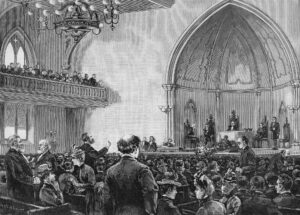It is one thing to accept that a doctrine is true; it is quite another for it to shape the life and ministry of the church. The doctrine of penal substitutionary atonement (PSA) is a controversial doctrine in some circles. But those of us who affirm that it is a truly biblical doctrine need to grapple carefully with how it should shape and inform our ministry.
The purpose of this brief article is to argue that PSA should be at the heart of our proclamation of the gospel—at the heart of our regular preaching of the word of God. There are important reasons for this both at the level of theological integrity and at the level of pastoral practicality.
Theological reasons for the centrality of PSA in preaching
Preaching that is biblical in the truest sense must be sensitive to the wider storyline of Scripture and properly contextualized within biblical theology, consciously shaped by certain key biblical-theological truths. Among these is the basic truth that the God of the Bible is rightly angry because of sin and will judge sin. There is little need to spend time here outlining a biblical theology of God’s justice and his holiness. This basic truth is so woven into the storyline of Scripture that we would have to willfully disregard the essential shape of salvation history to avoid it.
The Bible’s storyline is bookended with this reality and saturated with it: Genesis tells us that God expelled Adam and Eve from the Garden and judged them (and the world) for sin; Revelation tells us that a day is coming when he will execute his terrible judgment on the world. The fact that human sin incurs the judgment of God is the fundamental crisis of world history as far as the Bible is concerned. Any proclamation of the gospel that does not demonstrably flow from this biblical worldview and that fails to address this crisis is inadequate on a basic theological level.
Beyond this, and integrally related to it, preaching that is shaped by the wider storyline of Scripture must centre on the cross of Christ. There is a real sense in which true Christian preaching is nothing more and nothing less than the proclamation of Christ crucified. This was, of course, Paul’s conviction and his practice, as he so clearly affirmed in 1 Corinthians: ‘but we preach Christ crucified…’ (1:23); ‘For I resolved to know nothing while I was with you except Jesus Christ and him crucified.’ (2:2).
When we consider that both God’s judicial wrath and the cross of Christ are part of the very fabric of the Bible’s storyline, then the doctrine of PSA comes into clear focus – for it is at the cross that God addresses his own just anger at sin. There are, of course, many aspects to Christ’s achievement at the cross: he defeats Satan, he liberates his people from slavery to sin, he provides cleansing from defilement, and he achieves much more besides. Sometimes these (and other) aspects of his achievement are conceived as separate models of the atonement, among which PSA is simply another model on an equal footing (if indeed PSA is accepted as valid among the models).
But such a construal is inadequate and skewed. The theological reality is that all of the problems associated with sin relate to the fact that fallen humanity sits under the judgment of God; only with the propitiation of God’s just anger at sin can the other elements of the crisis of the Fall be dealt with. So, it is more adequate to think of PSA as standing at the heart of the achievement of the cross, with victory over Satan, release from bondage, cleansing from defilement (and so on) all radiating out from that reality and depending upon it.
Without probing that line of thought further, the basic implication is this: if we are to be truly and robustly biblical in our preaching, then our preaching must reflect the basic truth that God is rightly angry about sin and that, at the cross, Christ has fully borne and satisfied the judicial wrath that sinners deserve.
Pastoral reasons for the centrality of PSA in preaching
For those convinced of the doctrinal centrality of PSA, there is a danger of forcing a rather predictable and repetitive presentation of PSA into every sermon out of a sense of doctrinal obligation. Certainly that can be quite unhelpful and off-putting for a congregation, and it can often represent poor exposition of a given passage of Scripture. However, if these truths are woven into the fabric of Scripture as suggested above, there should be natural ways in which a doctrine of the atonement, rooted in and related to PSA, will flow from all of Scripture. That is, there should be fresh and contextually distinctive ways of preaching Christ crucified from any passage of Scripture.
What will be the practical and pastoral benefits of a commitment to keeping PSA central to our preaching of Scripture? Or, to think of it from the other angle, what would be the loss and cost attached to a failure to do this? In pursuing this line of inquiry, three kinds of answer emerge very quickly.
First, keeping PSA central to our preaching preserves for us a gospel that actually saves. For preachers who are attuned to the real-life experiences and feelings of a congregation, there is an understandable tendency to major on the ways in which Jesus can meet people in their various needs. And, of course, the Lord Jesus is kind beyond measure, more concerned for us than we know, and more than able to meet every need.
But the danger for us preachers is that we will drift into preaching a gospel that purely addresses the felt needs of the congregation. And so the Jesus of our proclamation quickly becomes the great therapist, the great lifestyle coach and, if we are not very careful, the great purveyor of health and wealth. But if we keep clearly in mind the full-orbed biblical doctrine of the atonement, grounded in the crisis of sin and the judgment of God, then we will be preserved from proclaiming such a superficial gospel. We will be disciplined to proclaim the true gospel, wherein Christ addresses our deepest and most fundamental need and wherefrom untold blessings flow, both in time and in eternity.
Second, keeping PSA central to our preaching gives us (and our congregation) an appropriate sense of urgency. If the gospel we proclaim bypasses the wrath of God at sin and the reality of a judgment yet to come – if the gospel we proclaim is essentially a gospel that addresses felt needs – then there is little urgency attached to its proclamation and response. If we are to be frank and honest about the contemporary situation within evangelicalism (broadly defined), we must acknowledge that a great deal of preaching today minimizes or bypasses the realities of sin and judgment. And the result is a distinctive lack of urgency in gospel proclamation and gospel belief. The fruits of this, of course, are very tangible. Missions agencies will tell you that recruitment from North American churches for the mission field is a very great (and very concerning) challenge.
Many pastors and elder boards will tell you that finding gifted, godly and well trained pastors to join their staff is very difficult indeed. Many churches and para-church organizations will be quick to report how hard it is to raise funds for gospel work. And if the gospel that is proclaimed is a gospel that largely addresses felt needs, all this is entirely unsurprising.
But if we recover and proclaim a gospel that addresses the true ugliness of sin, the judicial anger of God, and the self-substitution of Christ for sinners to bear that anger – we will recover a gospel that preachers want to proclaim to congregations, that missionaries want to take to the ends of the earth, and that believers will want to support in costly and sacrificial ways. Others will, no doubt, argue that it is possible to retain a sense of urgency in proclamation and response while denying that at the cross Jesus bears and satisfies the judicial anger of God in our place. Perhaps – but I for one remain unconvinced.
Third, keeping PSA central to our preaching engenders true love for Christ. No doubt we could all agree that we do not love Jesus as we ought. If we truly know him, we do love him, of course. But our love is feeble and often grows cold. And so the preaching of the gospel must renew and deepen our love for our Saviour. It would be entirely appropriate to say that the heart of the preacher’s purpose should be to promote true and deepening love for Jesus among his people. But the degree to which preaching achieves this will depend very significantly on the content of that gospel. That much is obvious.
And so when we bring this basic observation to bear upon the present discussion of PSA, we have to consider what will be the effect of proclaiming or avoiding this doctrine. Remember, PSA tells us that Jesus bore the judicial wrath of the holy God in my place and for my sin, so that at the final Day, I might be spared that unspeakable experience. Standing behind the doctrine of PSA and undergirding it at every point are the character and work of the God of love, whose compassionate heart for sinners moved him to intervene through such extraordinary and costly means for our salvation (Romans 5:8).
If we really understand the doctrine of PSA and the loving God who deigned to save us in such a way, and if this truth is part of our regular diet in preaching, then surely we will be moved to love our Saviour in increasing measure. Indeed, what truth could possibly move our hearts to love him more?
Should the doctrine of PSA shape and inform our preaching, undergirding our proclamation of Christ crucified? The answer must be yes—both for the sake of our theological integrity and our pastoral effectiveness.




















